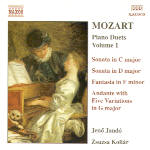Mozart’s piano duets are cornerstones of the four-hand literature, and their probing beauties have attracted numerous contenders on disc. Jenó Jandó and Zsuzsa Kollár generally favor buoyant tempos, dry-eyed articulation, and lean, fortepiano-like sonorities that ping more than they sing. The duo also observes every repeat. This approach lends itself best to the outgoing D major Sonata, yet somewhat trivializes the Handelian gravity of the F minor Fantasia. By contrast, the larger-scaled C major Sonata is a shade studio-bound and sober to a fault, lacking the operatic inflection and tonal solidity that distinguishes the Ingrid Haebler/Ludwig Hoffmann duo (Philips), or Richter and Britten’s unbridled, joyful live performance (Decca). But the duo brings requisite grace and simplicity to the elegant G major Andante and Variations, as well as the K. 19d C major sonata, written when Mozart was nine. I look forward to hearing Volume 2.
































